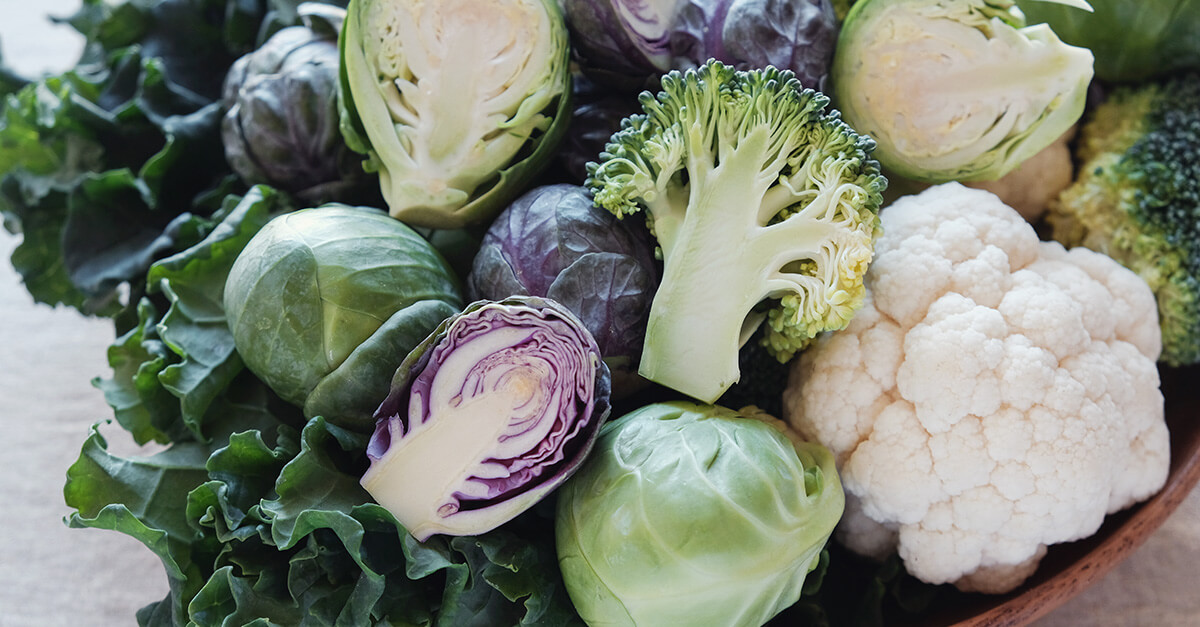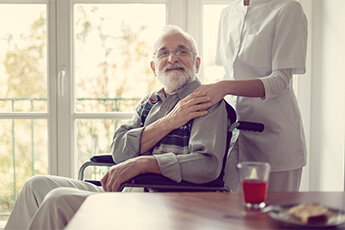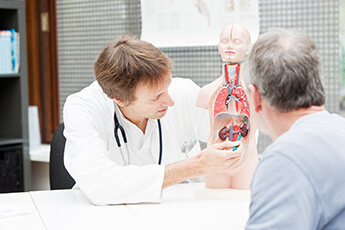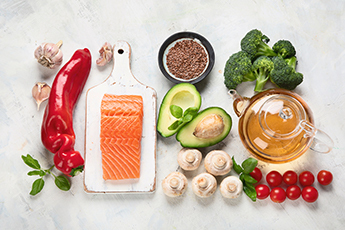Kidney cancer, diet, and nutrition: An evidence-based guide

If you have kidney cancer, your kidney function may be impaired due to tumors, kidney removal, or other cancer treatments. In these cases, doctors usually recommend certain dietary changes to help prevent kidney failure.
In this guide, you'll learn about the relationship between diet, nutrition, and kidney cancer, including:
how your diet can affect your kidney cancer risk
foods to eat and avoid for renal cancer patients
how cancer treatments can affect appetite and taste
real stories from patients living with kidney cancer
In the Inspire Kidney Cancer Survivors Community, members share their personal experiences of living with kidney cancer or related cancers and how to find support. This content should not be used as a substitute for professional medical advice, diagnosis, or treatment. Whether or not you have a kidney cancer diagnosis, it’s wise to speak with your doctor or a dietitian before making significant changes to your diet.
Can your diet cause or prevent kidney cancer?
Research suggests that dietary choices may increase or decrease the risk of renal cancer. However, the most important risk factors for kidney cancer are obesity, hypertension, and smoking. Additionally, the evidence on how specific foods may affect your kidney cancer risk is inconsistent.
In studies, when researchers control for major kidney cancer risk factors like obesity, hypertension, and smoking, the effect of food and nutrition on the risk of renal cancer is more difficult to detect. As a result, studies on diet and kidney cancer risk sometimes have conflicting results.
Although your diet plays a role in your risk of obesity and hypertension (which are two of the biggest risk factors for kidney cancer), so do other important factors, such as physical activity levels and genetic differences.
Foods and dietary habits that appear to reduce the risk of kidney cancer include the following:
vegetables (particularly cruciferous vegetables like broccoli), fruits, and other plant foods that contain flavonoids (antioxidants), including spices
foods high in omega-3 fats, such as wild-caught seafood
healthy fats such as olive oil
foods naturally rich in micronutrients (vitamins and minerals), especially foods high in vitamin C
moderate alcohol consumption
On the other hand, the following foods and eating patterns may increase the risk of renal cancer:
inflammatory foods, such as processed foods high in saturated fats
regular consumption of sugary foods like desserts or juice
eating lots of starches and simple carbohydrates
charred or burnt meats, which contain carcinogens
processed meat products with nitrates or nitrites (used as preservatives)
Other foods, including red meat and other animal products, are suggested to be a risk factor for kidney cancer in some studies and not in others.
One reason scientists aren't entirely sure about certain foods is that nutritional studies usually rely on observation — they aren't randomized or controlled. That means that it's hard to know whether a specific food is responsible for increased risk or if it could be due to other factors that weren't measured or taken into account properly.
For example, people who eat more red meat consume fewer fruits and vegetables on average and may make other unhealthy lifestyle choices. Even when scientists take these factors into account, it's difficult to make accurate calculations that can determine whether red meat consumption is responsible for health problems like kidney cancer.
Ultimately, it appears that eating a healthy diet that doesn't contain too much sugar or too many calories (which is also helpful in preventing obesity, a risk factor for renal cancer), and includes plenty of fruits and vegetables, can help prevent kidney cancer.
Kidney cancer is one of the ten most common cancers in America, affecting approximately 79,000 adults and 600 children and teenagers. Since the 1990s, the number of kidney cancer cases in the U.S. has steadily increased at a rate of approximately 1% per year for adults and 3% per year for youths. Learn more.
Does diet affect kidney cancer?
If you've been diagnosed with kidney cancer, your eating habits can make a significant difference in the course of the disease. Eating a diet that's healthy for your kidneys and provides adequate nutrition and sufficient calories can improve your quality of life and help prevent kidney failure.
Chronic kidney disease or renal impairment occur when your kidneys are damaged or otherwise unable to function properly. Kidney cancer can cause renal impairment in the following ways:
tumors can interfere with kidney function
kidney removal surgery (nephrectomy) may impair kidney function
medical therapies, including immunotherapy, radiation, or chemotherapy, can damage kidneys
Based on current estimates, of the 300,000 or more kidney cancer survivors in the United States, 1 in 3 has or will develop chronic kidney disease.
When chronic kidney disease progresses, it can lead to renal failure, which requires dialysis or a kidney transplant.
Doctors usually advise patients with chronic kidney disease to limit their intake of sodium, protein, potassium, and phosphorus to reduce the risk of kidney failure.
However, not everyone with kidney cancer has chronic kidney disease or renal impairment. If your kidney function is not impaired, your doctor may not recommend these dietary changes.
Lastly, you may have heard that some research suggests the ketogenic diet, a very low-carbohydrate, high-fat diet, can "starve" cancer cells and improve the effects of cancer treatment. This does not appear to be the case for kidney cancer, although early research does suggest there may be some benefits to following a ketogenic diet for certain other types of cancer.
According to recent studies in animals, the ketogenic diet may increase tumor growth and impair kidney function in kidney cancer. Due to a lack of human studies, and possible harm according to evidence from animal studies, the ketogenic diet may be an unwise choice for patients with renal cancer.
Metastatic kidney cancer, or stage IV kidney cancer, can be a challenging diagnosis to hear. Although the 5-year survival rate for people with all types of kidney cancer is 76%, the survival rate for people whose kidney cancer has spread to distant parts of the body is closer to 14%. However, survival rates can’t predict the outcome for any individual, and as kidney cancer treatments are continually improving, these statistics are also improving. Learn more.
What foods are good to eat when you have kidney cancer?
Eating a healthy diet rich in fruits, vegetables, fiber, and healthy fats can improve survival in cancer patients. Also, renal cancer and other forms of cancer often result in cachexia (weight loss), so it's important to eat adequate calories to help prevent muscle wasting.
If you have impaired kidney function or chronic kidney disease, your medical team will work with you to limit your intake of foods that could worsen kidney function while still obtaining adequate nutrition.
For patients with chronic kidney disease, adequate hydration is also important to maintain kidney function. Research suggests that consuming too much or too little water can worsen kidney function.
A study of 1,265 chronic kidney disease patients found that 1-2 liters of water per day (approximately 32-64 ounces) was most effective for preserving renal function. If you aren't sure how much water to consume each day, your medical team can help you determine the best strategy to stay hydrated without taxing your kidneys.
What foods should be avoided with kidney cancer?
It's a good idea for patients with kidney cancer to limit their intake of foods that are associated with renal cancer, such as processed foods high in saturated fats, sugary foods, starches, simple carbohydrates, charred or burnt meat, and processed meat products with nitrates or nitrites.
If your renal function is impaired, or you have chronic kidney disease, or you're living with one kidney due to a nephrectomy, your doctor may recommend the following dietary changes:
lower protein intake
reduced sodium intake
decreased consumption of phosphorus
less potassium intake
A nephrectomy is a major surgery that removes some or all tissue from a patient's kidney. Learn what to expect following nephrectomy surgery for kidney cancer.
Why does food taste different with cancer?
Cancer treatments, especially chemotherapy and radiation therapy, can reduce your appetite and make foods taste different. Evidence also suggests that inflammation and other changes that occur in advanced cancer affect how foods taste. Difficulty eating due to changes in taste is associated with weight loss, malnutrition, and other problems.
According to research, about 70% of patients undergoing chemotherapy experience changes in taste and smell, which usually results in difficulty eating.
Related symptoms include the following:
loss of the sense of taste
dry mouth (xerostomia)
metallic or unpleasant tastes in the mouth
indigestion and nausea
Current evidence suggests the following practices may help patients facing these difficulties:
trying new foods or recipes
chewing gum or drinking lemon juice before meals
eating small, frequent meals
maintaining good oral hygiene
While kidney cancer treatments can be lifesavers, they also cause side effects. You may experience treatment side effects while getting the treatment or months or years after treatment ends. Learn more.
Patient stories
Patients undergoing chemotherapy often struggle with appetite and taste changes:
"Chemotherapy and taste is so true! I so loved hard-boiled eggs, now I can't even fathom the thought of them." Go to post
"My husband has metastatic renal cell cancer. He is currently on 400 mg of Votrient chemotherapy and is having trouble eating. He's lost 10 pounds in the last three months since he lost his appetite. He says that meats and oily flavors are very unappealing to him. He does eat them but says 'he has to choke them down.'" Go to post
"I went through the same thing on a different medication. I couldn't even watch a TV show where food was being served and the Food Network was off limits. I met with a nutritionist who said high protein and high calories are needed to maintain weight under these conditions.... The key seemed to be neutral flavors or flavors that had some sweetness to them. Also small portions served several times a day rather than a large plate of food helped get past the 'I can't eat all this.' feeling. I about drove my wife mad trying to find something I would eat but the items above did stabilize my weight after I had lost almost thirty pounds. I have recovered some of my weight but honestly I was about 15 to 20 pounds too heavy to begin with. Dropping the weight did eliminate one blood pressure medication as well as cholesterol meds." Go to post
"We met with a nutritionist at our local cancer center. She said that my loved one has to find foods that give him more protein. She says he needs a minimum of 75 grams per day. That's a lot considering that meat and fats are repugnant to him right now. But she gave us a list of alternatives and we will try to get it in. We're using the internet to tell us how much protein is in foods. I don't know if eventually his taste buds will come back." Go to post
"Your nutritionist gave advice very similar to mine. She said 65 to 95 grams a day. Ensure Plus has 13 grams per bottle. 3 of those a day is 39 grams. You're half way there! I found I could tolerate instant cream of wheat cereal. Using half-and-half instead instead of water or skim milk has a lot of protein. Scrambled eggs using half and half and cheese adds protein. There are flavored yogurts which have over 20 grams of protein. Ice cream was a treat and again there is protein. It may seem like a daunting challenge and it may not be achieved every day but it can be done. Again I wish your husband and yourself all the best." Go to post
"Although you'd like to see a daily increase in weight, he almost has to check his weight less frequently, otherwise he may feel defeated and begin to question why he's trying so hard. When I was losing weight I had periods where I had to convince myself I was managing a decline and that at some point I would reach an equilibrium point and begin gaining from that point. You also have to remind yourself the weight loss is not totally the result of the medication affecting your taste but the cancer is contributing and that's the reason for increasing the protein and calories. If your husband is experiencing diarrhea he should be increasing his fluid intake to compensate and if the diarrhea is persistent he needs to speak to his doctor." Go to post
"Your father is still in the early stages of recovery. Loss of appetite is normal for most of us. Taste changes are also normal. Encourage him to have something to nibble on or drink at all times. Tiny amounts will eventually add up to a return to eating." Go to post
Want to connect with other people living with clear cell carcinoma and other types of kidney cancer today? Visit the Inspire Kidney Cancer Survivors Community.
Sources
Disclaimer
Member comments have been lightly edited for length and clarity. This content is for general informational purposes only and does not necessarily reflect the views and opinions of any organization or individual. The content should not be used as a substitute for professional medical advice, diagnosis, or treatment. Please consult your healthcare provider about any questions you may have regarding a medical condition.




